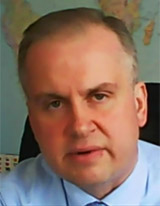The plan by pro-Russian separatists in eastern Ukraine to hold a referendum Sunday on secession amounts to “actions by some isolated groups” that will yield “no result,” Ukraine’s Deputy Foreign Minister Danylo Lubkivsky said in an online discussion with the Atlantic Council.
“The so-called terrorist referendum, [is] illegal, and of course there are no conditions for anybody there to hold these kind of activities,” Lubkivsky said from his office in Kyiv. He spoke in a session moderated by Atlantic Council Executive Vice President Damon Wilson.
In response to a question, Lubkivskiy did not say what steps if any the Ukrainian government may take to prevent the attempt to organize voting in towns or cities that are partly or largely controlled by the separatists.
Russian President Vladimir Putin’s public call for the separatists to postpone the planned plebiscite “is a mockery and by no means is a sign of good will,” Lubkivsky said, because Russia continues to back separatist violence. “We can’t trust their words,” he said of the Russian government’s statements. He repeated Ukraine’s call for Russia to implement last month’s Geneva agreements aimed at reducing the conflict, demanding that Russia “cease action by subversive groups” that he said it supports in Ukraine.
Lubkivsky’s remarks included these:
- On the nature of the conflict. “There is no civil war in Ukraine. The essence of the conflict is aggression of the Russian Federation against Ukraine, occupation of the Crimea, and impudent interference in our internal affairs, accompanied by support for terrorist actions against Ukrainian citizens and the territorial integrity of our country. There is no civil war.”
- On Ukraine’s need to build acceptance among Russians of Ukraine’s independence. We know that our friends in Russia, unfortunately they’ve been poisoned by this Russian [government] propaganda for years. And that poison ruined their perception of the relations between Ukrainians and Russians. We have to tell them also a very important story about the independent Ukrainian nations. They have to recognize that Ukraine are an independent nation.
- On Ukraine’s need to undertake difficult economic and political reforms. “That’s our homework to be done. … to change these negative traditions that are so deeply rooted in Ukraine – these negative traditions of corruption, of compromises on [building] a market economy.”
- On the possible need for further international sanctions against Russia. “If Russia does not halt its threats, there must be more sanctions” by the international community against it. “The sanctions against the [Russian] threat may be the best investment in our future, because this investment may also help Russia to change those very dangerous tendencies that unfortunately prevail among Russian leaders.”
